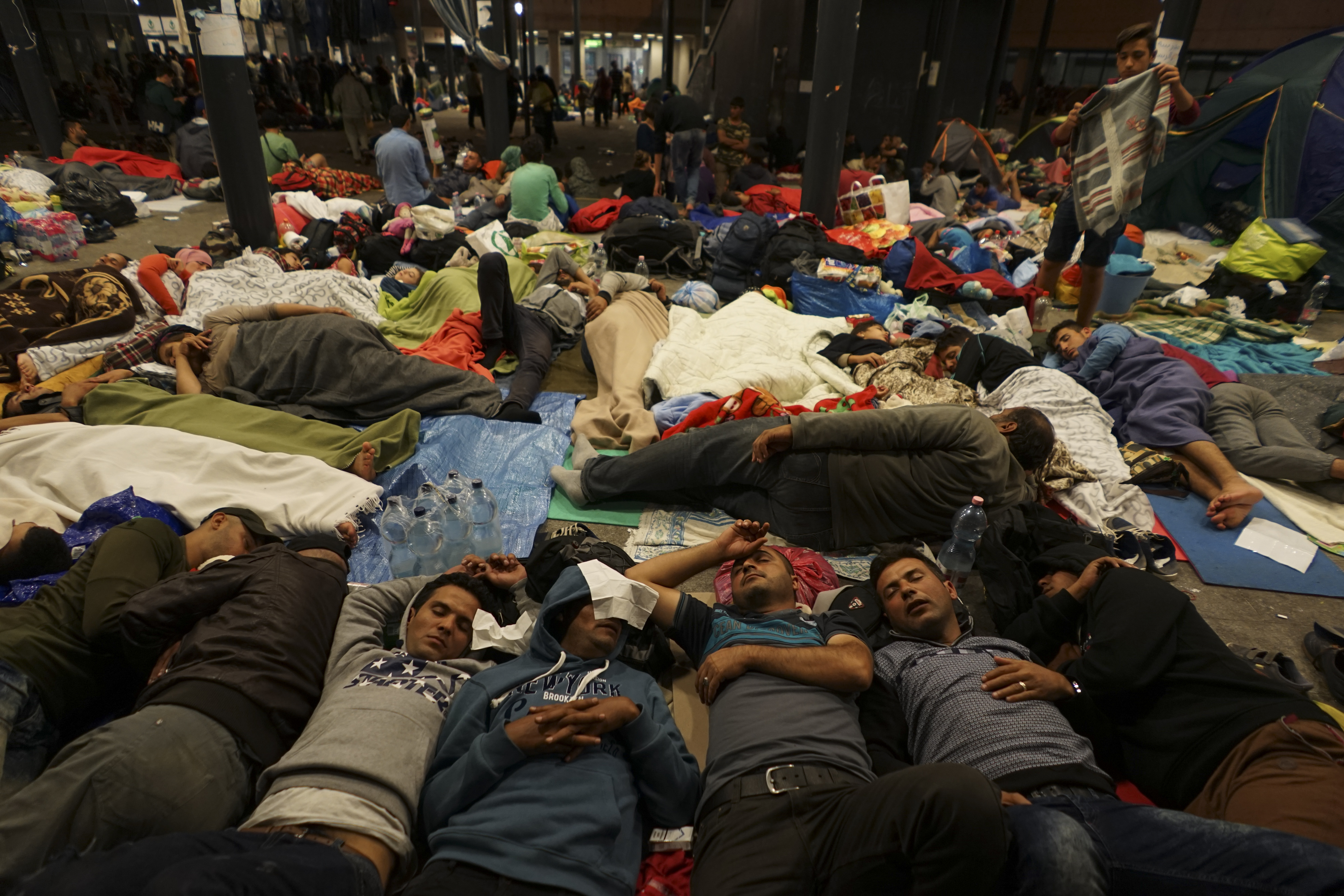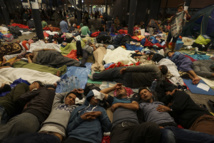The efforts of the European Commission seem to be very modest against the background of approximately 700 thousand refugees who have already arrived this year in Europe.
Surely, quite a decent money - about 10 billion euros from different EU funds – have been allocated to the problems of refugees for 2015 and 2016. The lion's share falls on Greece and Italy, the foreposts of welcoming refugees.
However, the mechanism of their distribution in other EU countries is still not working. The European Commission representatives presented as the success the fact that a group of Eritrean refugees has been send from Italy to Sweden on the EU’s resolution, adopted earlier. In total, there were 19 people. Not that much, right?
The mentioned decision, taken by Ministers of Internal Affairs of the EU not unanimously, but only by a majority vote, provides the resettlement of 160,000 refugees. This is not much, admits the European Commission. Although on the other hand, its representatives say it is necessary to start somewhere, and "create a political situation in which the distribution of refugees in EU countries will be considered as normal."
Six months ago this theme has been an absolute taboo, all insisted on the sovereign right to decide who and how much they will receive. And these 19 Eritreans - the first sign of EU’s joint responsibility for the solution of the refugee problem.
Brussels understand that the Dublin agreements in fact ceased to exist, but substitution it for the quota system will take time. The European Commission will put forward specific proposals in this regard in the spring of next year.
In the meantime, Brussels and Berlin are pinning their hopes primarily on the creation of large registration centers to receive refugees - in the EU they are called Hot Spots - at the external borders of the European Union, particularly in Italy and Greece. However, the European Commission and the German government meant by these Hot Spots a few different things.
Brussels sees them rather as procedures, when mobile teams of officials from various departments of the EU register refugees, take their fingerprints, decide who has reason to seek asylum in the European Union and who does not.
The first then are sent to one of the EU countries, chosen by certain criteria: the presence of relatives or even friends, language, religion, qualifications, cultural traditions, personal preferences and the capabilities of the host country. Brussels, of course, understands it is not always possible to meet wishes of a refugee or the right to choose, for example, Estonia.
As for the latter (those assessed by European officials as having no reason to seek asylum), they will be promptly send to their homeland. For this, the European Commission asks to authorize a EU border agency Frontex to issue substitute documents for refugees, "lost" their passports, and send them to home.
Be that as it may, says the government of Germany. Yet adds that the Hot Spots mechanism must be supplemented by appropriate real estate infrastructure, that is, camps in which the first category would expect setting out in the country of destination, and the second would be wait for a plane to home.
Another important theme of the summit this Thursday will be Turkey, on which the European Commission lay no less hope than on the Hot Spots. This particular country gets the main flow of refugees through its land and sea borders with Greece.
Brussels calls a dialogue, started with Ankara on this subject, "constructive". It is going to declare Turkey a safe country what will no doubt enhance the prestige of President Erdogan, and prepare to set aside one billion euro to improve the situation in the refugee camps on its territory, and thereby reduce their flow in Europe.
If the Turkish government satisfy the wishes of the EU, in exchange Turkey will be promised to accelerate the process of abolishing the visa regime. Some observers do not rule out that in this case will be resumed the negotiations on the accession to EU membership.
It can hardly be considered a coincidence that in the next Sunday, October 18, Chancellor Angela Merkel goes for talks with the President and Prime Minister of Turkey in Istanbul. Previously, she did not see in Turkey as an EU member in the foreseeable future. In her view, the country would have been only a partner with a "privileged status". Yet, perhaps, the refugees situation prompted the Chancellor to revise the earlier view.
At last, the European Commission with some concern draw attention to the new route to Europe, which is being mastered by increasingly resourceful refugees - northeast, across Russia to Norway.
Original by Nikita Jolkver, DW
Surely, quite a decent money - about 10 billion euros from different EU funds – have been allocated to the problems of refugees for 2015 and 2016. The lion's share falls on Greece and Italy, the foreposts of welcoming refugees.
However, the mechanism of their distribution in other EU countries is still not working. The European Commission representatives presented as the success the fact that a group of Eritrean refugees has been send from Italy to Sweden on the EU’s resolution, adopted earlier. In total, there were 19 people. Not that much, right?
The mentioned decision, taken by Ministers of Internal Affairs of the EU not unanimously, but only by a majority vote, provides the resettlement of 160,000 refugees. This is not much, admits the European Commission. Although on the other hand, its representatives say it is necessary to start somewhere, and "create a political situation in which the distribution of refugees in EU countries will be considered as normal."
Six months ago this theme has been an absolute taboo, all insisted on the sovereign right to decide who and how much they will receive. And these 19 Eritreans - the first sign of EU’s joint responsibility for the solution of the refugee problem.
Brussels understand that the Dublin agreements in fact ceased to exist, but substitution it for the quota system will take time. The European Commission will put forward specific proposals in this regard in the spring of next year.
In the meantime, Brussels and Berlin are pinning their hopes primarily on the creation of large registration centers to receive refugees - in the EU they are called Hot Spots - at the external borders of the European Union, particularly in Italy and Greece. However, the European Commission and the German government meant by these Hot Spots a few different things.
Brussels sees them rather as procedures, when mobile teams of officials from various departments of the EU register refugees, take their fingerprints, decide who has reason to seek asylum in the European Union and who does not.
The first then are sent to one of the EU countries, chosen by certain criteria: the presence of relatives or even friends, language, religion, qualifications, cultural traditions, personal preferences and the capabilities of the host country. Brussels, of course, understands it is not always possible to meet wishes of a refugee or the right to choose, for example, Estonia.
As for the latter (those assessed by European officials as having no reason to seek asylum), they will be promptly send to their homeland. For this, the European Commission asks to authorize a EU border agency Frontex to issue substitute documents for refugees, "lost" their passports, and send them to home.
Be that as it may, says the government of Germany. Yet adds that the Hot Spots mechanism must be supplemented by appropriate real estate infrastructure, that is, camps in which the first category would expect setting out in the country of destination, and the second would be wait for a plane to home.
Another important theme of the summit this Thursday will be Turkey, on which the European Commission lay no less hope than on the Hot Spots. This particular country gets the main flow of refugees through its land and sea borders with Greece.
Brussels calls a dialogue, started with Ankara on this subject, "constructive". It is going to declare Turkey a safe country what will no doubt enhance the prestige of President Erdogan, and prepare to set aside one billion euro to improve the situation in the refugee camps on its territory, and thereby reduce their flow in Europe.
If the Turkish government satisfy the wishes of the EU, in exchange Turkey will be promised to accelerate the process of abolishing the visa regime. Some observers do not rule out that in this case will be resumed the negotiations on the accession to EU membership.
It can hardly be considered a coincidence that in the next Sunday, October 18, Chancellor Angela Merkel goes for talks with the President and Prime Minister of Turkey in Istanbul. Previously, she did not see in Turkey as an EU member in the foreseeable future. In her view, the country would have been only a partner with a "privileged status". Yet, perhaps, the refugees situation prompted the Chancellor to revise the earlier view.
At last, the European Commission with some concern draw attention to the new route to Europe, which is being mastered by increasingly resourceful refugees - northeast, across Russia to Norway.
Original by Nikita Jolkver, DW



















